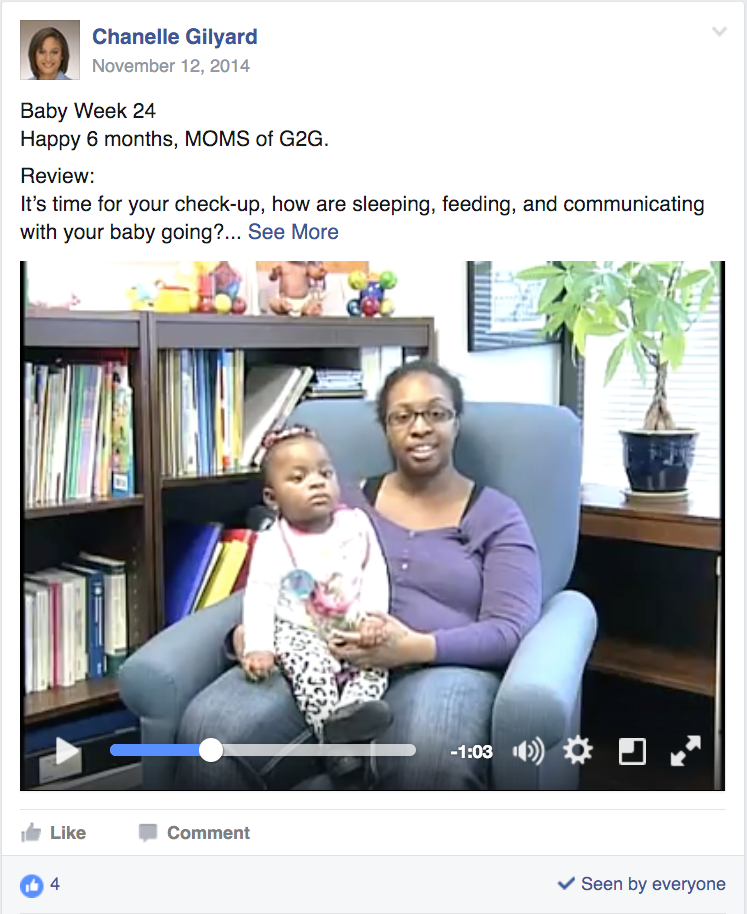Facebook Groups for Mothers to Improve Child Health: The Grow2Gether Trial
The last time you used Facebook, did you use it to get advice from friends or family? Maybe you needed it to find a new doctor or get suggestions on healthier dining options? Knowing how often people use Facebook to find information, we wanted to understand how low-income mothers might be able to use social media to promote healthy growth for their infants that are at-risk for childhood obesity.
Childhood obesity is highly prevalent and associated with a range of adverse health outcomes including asthma, type 2 diabetes and risk factors for heart disease. Moreover, having an overweight mother, being born into poverty and being an ethnic minority increases an infant’s risk for developing obesity in childhood.
Studies suggest that high-level parent engagement is necessary to reduce childhood obesity, but it can be difficult for physicians to engage low-income parents, who often lack the resources necessary to attend in-person meetings. Social media services, like Facebook, have the potential to meet these parents where they are, using tools they already use daily. In fact, 88 percent of young adults in the U.S. use Facebook and 92 percent own smartphones, with low-income families relying on these devices increasingly as their main source of Internet access. Therefore, we created the Grow2Gether intervention to engage this difficult-to-reach population through private Facebook peer groups.
Social media services, like Facebook, have the potential to meet these parents where they are, using tools they already use daily.
Our team enrolled pregnant women whose infants would be at a high-risk of obesity – those with mothers who began pregnancy overweight or obese and were Medicaid-insured – in the Grow2Gether intervention. We were happy to have 87 pregnant women initially enrolled in the study, 43 of whom went on to participate in the intervention group of our randomized control trial, the gold standard research method for interventions, that featured the Facebook-based peer groups. We compared results from parents in our peer groups to parents that received only text message reminders for infant primary care visits. (The Grow2Gether group also received these appointment reminders.)
A psychologist specializing in obesity treatment facilitated the Facebook peer groups, each of which included about 10 women. The psychologists posted information on infant feeding practices, sleep, positive parenting and maternal well-being. They also posted weekly videos demonstrating healthy behaviors and discussing topics related to healthy growth. Many of the instructional videos featured women from the same community as the participants.
Facebook group members could respond to the videos, as well as create their own posts with questions, photos and videos. Members could then comment on one another’s posts and receive feedback from the facilitating psychologist. All 43 women joined and posted in their Facebook groups, with members posting an average of 30 times per week. The content of the posts spoke to the high-level of engagement and interest among participants; participants frequently posted questions and information, supported one another’s healthy behaviors and discussed curriculum topics. As one mother said, “I think it’s helpful because the advice is coming from other mothers like myself.”
The mothers who participated in the Facebook group showed more improvement in adopting healthier feeding behaviors than the group that only received text message appointment reminders. While the Facebook-based groups did not result in significant changes in other behaviors, we considered the high-level of engagement among a hard-to-reach group of participants a clear success. When surveyed, all participants in the Facebook groups described the group positively, and nearly all mothers said they would recommend the program to others. The lack of improvements in other health outcomes may speak to a need to combine the social media intervention with in-person contact, such as home visits; in fact, 24 percent of mothers suggested more in-person meetings as a way to improve the groups.
Engaging parents from low-income groups to promote healthy behaviors is a major challenge for health care providers in improving child health. Internet-based peer groups like Grow2Gether may prove helpful across a range of conditions for both caregiver and child health. The key challenge and a focus of our future research will be to learn how best to use these peer groups to motivate health-promoting behaviors in families at the highest risk.
Guest blogger Rachel Gruver, MPH, is a former PolicyLab research associate and current project manager in the Department of Population Medicine at Harvard Medical School and the Harvard Pilgrim Health Care Institute.
